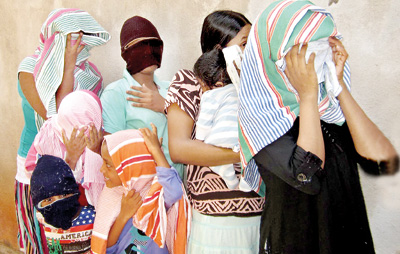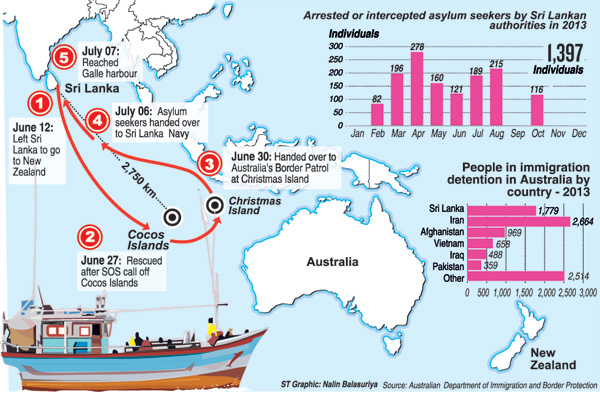News
Washed up
Two Sri Lankan families from the south planned a voyage for 41 asylum-seekers and a pet stray dog for what they thought was a new and prosperous life in New Zealand. Instead, they sailed right into the hands of Australian troops engaged in “Operation Sovereign Borders”. They complained of being ill-treated with food past its shelf life. The dog, however, was given a shampoo bath, fed milk and choice bacon.

Some of the ‘boat people’ who were sent back. Pic by M.D. Nissanka
The saga of the 41, handed over to the Sri Lanka Navy in international waters off Batticaloa, played out in the old colonial building of the Galle Magistrate’s Court on Tuesday. Five of those who allegedly planned the voyage were remanded, nine children were released and 27 more were given bail – cash to the tune of Rs. 5000 and surety of Rs 100,000 each.
After a break of eight months, this is the first case of Sri Lankan asylum-seekers being rounded up by Australian authorities. The move has drawn international ire with various groups and United Nations agencies charging that the Australian action violated international law. The Canberra Government is, however, defending its actions.
In expressing concern about Australia’s move to return the asylum-seekers to Sri Lanka, the United Nations High Commission for Refugees questioned the legality of the enhanced screening procedures said to have been followed in processing the 41 individuals while they were held in mid-ocean by Australian authorities.
The former Australian Prime Minister Malcolm Fraser referred to Australia’s decision to detain a second boat of asylum-seekers of Sri Lankan origin as “piracy on the high seas”.
Australian Premier Tony Abbott defended the policy of turning back asylum-seeker boats and said what his government did at sea was in line with its international obligations and safety protocols. The journey of the 41 asylum-seekers was planned over a month, with organisers recruiting interested parties through their network of friends.
When Kosala’s* (name withheld on his request) brother-in-law told him about an opportunity to go to New Zealand he was quick to seize the opportunity.
“I ran a small teashop near my house in Angunukolapelessa but the income was not enough to feed my family of four. I thought it would be better to make use of this opportunity and leave for New Zealand,” Kosala told the Sunday Times.
“My brother-in-law got to know of the opportunity through a friend. We went and met Ranjith Saparamadu, who organised the trip. The initial price for the journey was quoted at Rs. 250,000 per person but was reduced to Rs. 200,000 after negotiation,” he said.
“When the money was made ready Saparamadu came and collected the money from my brother-in-law and asked us to wait for further instructions.
“We were also given a list of things to bring when they come. The list included food items such as biscuits, milk power, dates and other items such as Panadol to be used if necessary. These were given to the friend of my brother-in-law, who passed it on to Saparamadu,” Kosala said.
“The day before the Poson Poya Day I was planning to go to Colombo to see my brother but when I asked my brother-in-law to accompany me, he told me not to go. He informed me that we were to set sail on the 12th. We got ready in haste – got all the clothes packed and in the evening took the bus to Hungama.
“From there the we took the 8pm bus to Ampara. They were given instructions to wait near a particular Hindu temple.”
“When we got down in Ampara we were joined by four others, and we took a three-wheeler to the temple. Just as we reached it a van drove up and he people in it asked if we were part of the journey project and got us aboard and we sped off. It all happened in less than five minutes”, Kosala recounted.
 “The van dropped the group of the six of us at the departure point, where the organisers had arranged for two small motor boats to take them to the multi-day boat. One boat was waiting for us with the engine running, ready to take off immediately. Within seconds they were helping us on to the main boat.
“The van dropped the group of the six of us at the departure point, where the organisers had arranged for two small motor boats to take them to the multi-day boat. One boat was waiting for us with the engine running, ready to take off immediately. Within seconds they were helping us on to the main boat.
“It was so dark we didn’t see anything. We just huddled close to each other and waited. There was no moving about or anything. It was on the following morning that we saw there were more people in the boat other than the six of us,” he said.
“The organisers claimed that they had contacts with individuals in New Zealand before they left. They even had bought a brand-new satelllite phone from Colombo just for the journey,” Kosala said.Chamal (name withheld on his request), who boarded the boat from Matara, told the Sunday Times that even though they passed several boats along the way none were Sri Lankan Navy boats. They left Sri Lankan limits undetected.
“What Saparamadu and his wife – Sujeewa Akka – said was that we will be going through international waters and from there to New Zealand.“Sujeewa Akka said she was communicating with officials in New Zealand through a satellite phone. She claimed they promised to help us. She said a lawyer there was helping them. When we were near Indonesia they said to come that way and promised to help us,” said Chamal.
“In deep seas the boat was caught in storms and our journey became difficult. The waves were high, the boat rocked too much and filled up with water. All we could to was hold onto something.“For 14 days it was like this. We were terrified – our lives were in danger,” Chamal said.
Mrs Saparamadu, claimed she and her husband Ranjith, who is now in remand custody, called New Zealand authorities on their satellite phone when they started having problems with their boat. After that, she said, they had received a call from Australian authorities.She claims to have spoken to a “Mr. Peter” who said they would come and “save” the group.
Mrs Saparamadu, who was the communication point in the boat as she was able to speak English, told the Sunday Times in broken English she did not want to give the location of the boat to Australian authorities. “Planes came and checked. I doesn’t (sic) want to go to Australia. We doesn’t want to go to Australia. Then he (Mr. Peter) called and they came to us. Two, three days (they) stay with us,” she claimed reiterating that the couple’s intentions were not to go to Australia.
“The Australian naval officers handed us over to Australian Border Protection team.”(The team is an especially commissioned team under “Operation Sovereign Borders” programme implemented by Abbott Government to combat illegal maritime arrivals to Australia.)
“They never took us to land. They said we are going to a safe place. The transfers happened at night. It was dangerous and frightening,” she claimed rather emotionally. The group was not given any concrete information about their situation.“At one point they said that we would be put in a second boat which had arrived with 153 Sri Lankans. They scolded us and called us ‘rotten Sri Lankan people’. They said that we will be put onto a boat where there were 150 people.
“We were always at sea. We were scared. We did not know what was happening to us,” another returnee, Priyanka* (real name withheld), said.
“The food they gave to us was expired. Lunch was a sandwich, two biscuits and half of an orange. Morning was cereal and at night were rice. It was like a prison there. There was a month-old baby with us but they did not even treat him well,” Priyanka claimed. Unknown to them the Customs and Border Protection boat had carried the group close to Sri Lankan waters. Kosala thought they were being taken to Christmas Island. Until Priyanka saw the Samudra Navy boat he did not know where they were either.
Sujeewa said the Australian boat had brought them within 10km of Sri Lanka. “They came close to Sri Lanka then handed us over to Samuduru boat. In two hours of getting into the Samuduru boat we saw the Batticaloa coastline,” Sujeewa said. Once the group was brought back to Galle on Monday its members were questioned by the Criminal Investigations Department. An officer of the Police Special Task Force who was among the group was also remanded along with the organisers of the boat trip. His wife and two-month-old baby were released.

